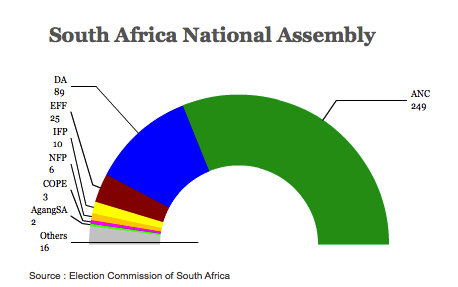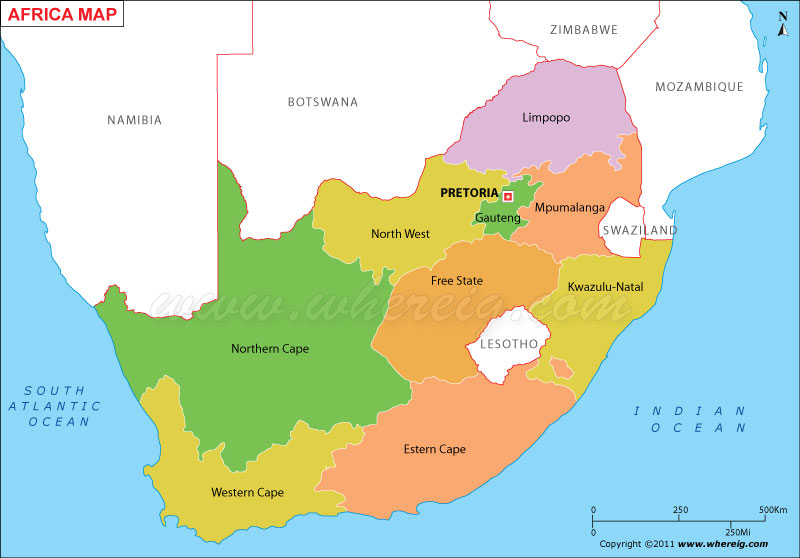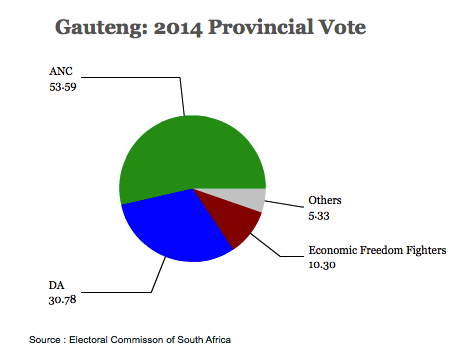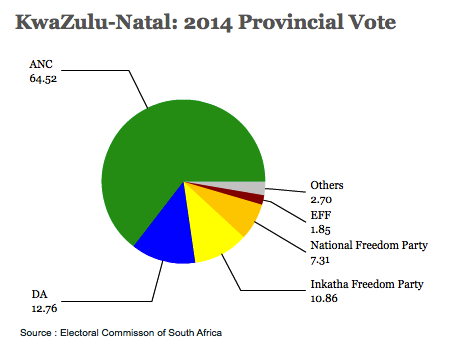For the record, I’ve updated the final charts from this week’s earlier South African national elections — you can read more analysis of what the results mean here, and you can read more coverage leading up to the vote here. ![]()
Here’s the final result for the national vote:
The final result for the ruling African National Congress (ANC) was 62.15%, That’s slightly less than in 2009, when it won 65.90% of the vote and in 2004, when it won 69.69% of the vote, but it’s close to the 62.65% that it won in the initial 1994 post-apartheid election. It’s generally an impressive victory, and though it falls short of the two-thirds margin that president Jacob Zuma may have hoped for, the ANC didn’t come close to falling below the 60% mark, as some of its officials once feared.
The Democratic Alliance (DA) posted its best-ever election result, gained 5.57% on its 2009 showing. But it’s still far, far behind the ANC, and it has quite a long path if it wants to become a truly credible alternative to the ANC.
Here’s the expected seat distribution in the 400-member National Assembly:
The ANC will drop from 264 seats to just 249 seats. Although it won’t have a constitutionally relevant two-thirds majority, it could still reach that threshold if former ANC Youth League president Julius Malema, who was kicked out of the ANC and now leads the Economic Freedom Fighters (EFF), which won 25 seats in its first-ever election, joins forces with the ANC majority.
The DA’s steady gains mean that it has gained 22 seats — it will go form a 67-member caucus to an 89-member caucus.
Here’s the result in Western Cape, the only province that’s not currently governed by the ANC. With 5.8 million people, it’s the fourth-most populous province in South Africa. DA leader and former Cape Town mayor Helen Zille has expanded her party’s lead here, and she will continue as Western Cape’s premier for the next five years:
In Gauteng, home to South Africa’s largest city, Johannesburg, and its capital, Pretoria, and the most populous province with 12.3 million people, the DA’s Mmusi Maimane, a rising opposition star and a member of the Johannesburg city council, waged a strong campaign against a troubled ANC leadership. Nonetheless, the result was a clear victory for the ANC:
Finally, in KwaZulu-Natal, the second-most populous province with 10.3 million South Africans, the DA will become the official opposition for the first time:
The once-strong Inkatha Freedom Party, formed in 1975 as an alternative to the ANC and that, with its appeal to South Africa’s Zulu population, once controlled the provincial legislature, has been pushed to third-party status after years of infighting. Zanele kaMagwaza-Msibi, the mayor of Zululand District Municipality, and a former IFP chairperson, founded the National Freedom Party (NFP) in 2011 after serving as the IFP’s candidate for premier in KwaZulu-Natal in the prior election.
Finally, it’s worth noting that in two additional provinces, Limpopo and North West, the EFF narrowly edged out the DA to become the official opposition.






3 thoughts on “Final South African election results”